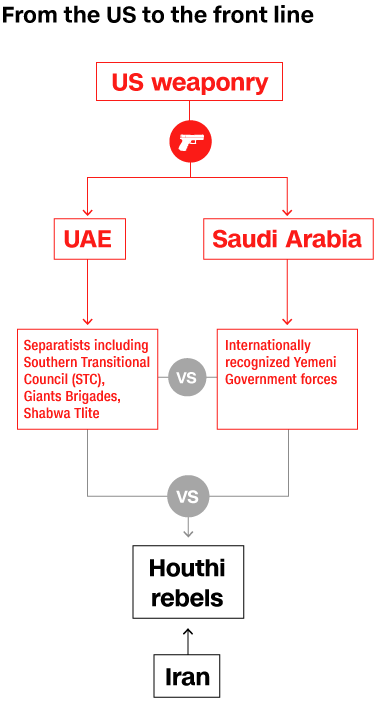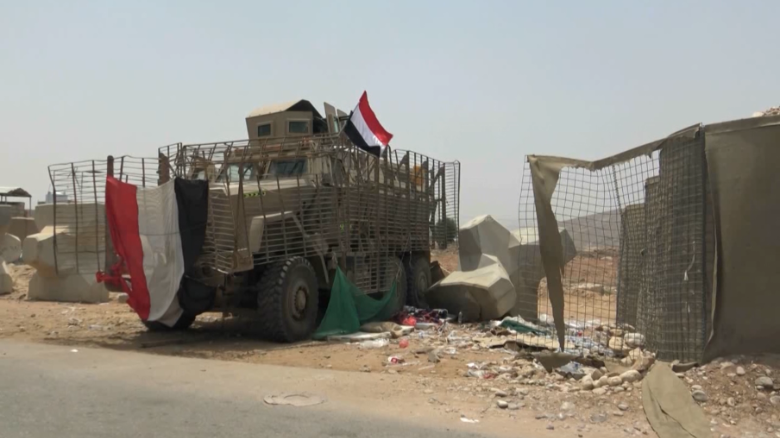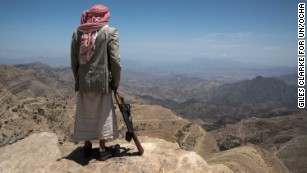American weapons ended up in the wrong hands in Yemen. Now they're being turned on the US-backed government
American-made weaponry has fallen into the hands of rival militia groups in Yemen, some of whom have turned their arms against each other in a bitter and worsening conflict, a new CNN investigation has found.
Fresh evidence shows that military hardware that was supplied to US allies has been distributed in contravention of arms deals to militia groups, including UAE-backed separatists. They are now using it to fight the Saudi-supported forces of the internationally recognized government, who are also armed with US weapons.
These new findings follow an exclusive investigation by CNN in February which traced US-made equipment that was sold to Saudi Arabia and the United Arab Emirates. The weapons were being passed to non-state fighters on the ground in Yemen, including al Qaeda-linked fighters, hardline Salafi militias and the Iranian-backed Houthi rebels, the report found, in violation of arms sales law.
Following CNN's initial reporting, the Pentagon said it had launched its own investigation into the unauthorized transfer of US weapons in Yemen. But more than half a year on and the situation on the ground only seems to have got worse.
Related Article: Sold to an ally, lost to an enemy
Saudi Arabia has led a coalition, in close partnership with the UAE and including various militia groups, to fight Iranian-backed Houthi rebels in Yemen since 2015. But, in a clear break with its Saudi partners, the UAE said in July that it was reducing its forces in the country, and fighting escalated between separatists and government forces on the ground in August. The UAE has since thrown its support behind the separatist movement.
That month, separatists said they'd taken control of the strategic port city of Aden after days of fighting with government forces. A couple of weeks later, the Yemeni government accused the UAE of carrying out a series of airstrikes that killed dozens of its troops -- but the UAE said it was targeting terrorist militias.
Saudi-backed forces have since regained control of Aden and talks are under way to end the power struggle over the city, news agencies report.
As infighting has escalated in southern Yemen, ISIS has seized the opportunity to resurface there. It claimed responsibility for a series of attacks in Aden in August, the first in more than a year and a worrying sign that the conflict is creating a vacuum for extremists to flourish.
US lawmakers have reacted with outrage to CNN's new findings. One of them, Senator Elizabeth Warren, a frontrunner to become the Democratic Party's presidential candidate in 2020, said: "One report of US military equipment ending up in the hands of our enemies is troubling. Two reports is deeply disturbing."
Warren said she intends to pursue the findings with the Trump administration, adding: "The Defense and State Departments have not yet provided answers to questions I asked back in February and I intend to follow up."
Breaking arms agreements
Working with local journalists, CNN was able to film a number of US-made Mine-Resistant Ambush Protected (MRAP) vehicles that have been used by separatist militia groups led by the Southern Transitional Council (STC).
One was a BAE Caiman that was used by separatists in the fight for Shabwah, southern Yemen, against government forces in August.
It, like several other pieces of weaponry that CNN identified, can be traced back to a $2.5 billion arms sale contract between the US and the UAE in 2014. Like all arms deals, this contract was bound by an end user agreement which certifies the recipient -- in this case the UAE -- as the final user of the weaponry. From this evidence, it is clear that this agreement has been broken.

In February, the UAE told CNN that there was no violation of end use requirements "in any manner."
Inside the vehicle was further evidence of its provenance. Its air conditioning system had a serial number from American company Real Time Laboratories, indicating the part was manufactured at its facility in Mississippi.
When asked whether it knew if its technology was ending up in the wrong hands in Yemen, Real Time Laboratories told CNN they had supplied the product to BAE Systems in 2010 under a US government subcontract, but "cannot comment on what the US Government may have eventually done with this vehicle."
A spokeswoman for BAE Systems, which manufactured the Caiman MRAP vehicle, said the company complies with "all relevant export control laws and regulations in the countries in which we operate," and referred CNN to the Pentagon for further comment.
In response to CNN's new findings, Pentagon spokesperson Lt. Col. Carla Gleason said in September that the joint investigation by the State Department and Department of Defense into unauthorized weapons transfer in Yemen remains "ongoing."
Driving into battle
Analyzing hours of social media video of recent clashes in southern Yemen, CNN found multiple instances of American MRAPs being used by militia groups, many of them fighting against government forces.
One of the most prominent is a group known as Alwiyat al Amalqa or "Giants Brigade" -- a predominantly Salafi, or ultra-conservative Sunni -- militia supported by the UAE. One of their videos shows a US-made MaxxPro MRAP vehicle, purportedly being driven in convoy to join the separatists' battle against government forces in the south.

A US-made BAE Caiman MRAP vehicle captured by Yemeni army forces from separatist groups in Shabwah, southern Yemen. Photographed in September 2019.
The Giants Brigade did not respond to CNN's requests for comment. Earlier in the year, a senior Emirati official told CNN the Giants Brigade was "part of Yemeni forces" and under the "direct supervision" of the UAE. But the brigade has now joined the separatists in their battle against the government.
Responding to the latest evidence, a UAE official said: "There were no instances when US-made equipment was used without direct UAE oversight. Except for four vehicles that were captured by the enemy."
The Saudi Arabian government has not responded to CNN's request for comment on this issue.
Not only is US weaponry being used directly against America's allies in Yemen, but its presence also plays into Iranian propaganda in the region. The latest example of this saw footage being broadcast on a pro-Iranian Lebanese channel that showed US-made armored vehicles being unloaded into a Yemeni port off UAE ships. It turned out this footage was not recent, but the broadcast indicates the presence of US hardware in Yemen continues to be a card played by America's enemies.
Pentagon pledges
With the conflict spiraling and the role of US weapons in its deterioration becoming clearer, all while the humanitarian crisis deepens by the day, the Pentagon has pledged to investigate how its military hardware ended up in the wrong hands.
Speaking at a Senate hearing the day after CNN's initial report was published in February, Gen. Joseph Votel, then head of Central Command (CENTCOM) said the military was "looking more closely at the allegations."
He was categorical that the United States has "not authorized Saudi Arabia or the Emirates to retransfer any of this equipment to other parties on the ground in Yemen."
In recent months there have been multiple efforts by US lawmakers to force President Trump to end US financial and military backing for the war in Yemen.
Ex-Obama administration officials push Democrats in Congress to defund war in Yemen
Senator Chris Murphy authored an amendment to the annual US defense spending bill, which is currently being debated in Washington, that would cut off support for the Saudi-led coalition until the Secretary of Defense could certify that both the Saudis and Emiratis have stopped transferring US weapons to third parties in Yemen. It's just one of recent bipartisan efforts in the US Congress to address US military involvement in Yemen.
Sen. Murphy responded to CNN's latest findings, saying: "For years, US-made weapons have been fueling the conflict in Yemen and it's no surprise they are now ending up in the hands of private militias."
"This exposes sensitive military technology and endangers our soldiers. It's also a violation of US end-use agreements that govern our arm sales. That's why I pushed for and got passed an amendment in the Appropriations Committee that gets at stopping this problem," Murphy added.
It's not only lawmakers trying to end US support for the war in Yemen. This week 100 Christian faith leaders from 50 states wrote an open letter calling for Congress to cut off arms sales and military support to Saudi Arabia and the UAE in order to stop what they call "the world's worst humanitarian crisis."
Calls for change are also coming from outside the US. The United Nations said last month that countries that supply weapons to parties involved in Yemen's conflict may be complicit in war crimes.
A UN-commissioned panel of experts recommended that the US, UK and France "refrain from providing arms to parties to the conflict" because of "the prevailing risk that such arms will be used by parties to commit or facilitate serious violations of international humanitarian and human rights law."
News Courtesy: www.cnn.com












